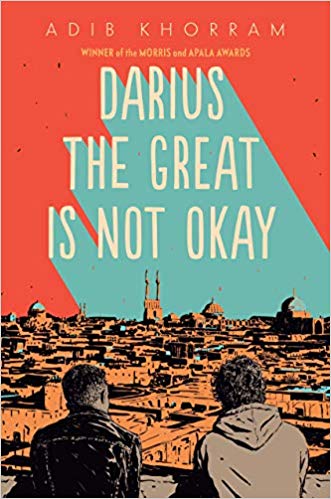 Darius the Great Is Not Okay is a unique book. Darius is an American kid whose mother is from Iran and whose father is Teutonic stock, and he is under treatment for depression. You don’t see a lot of YA featuring boys of color with depression, so I was curious to see how this one would play out. Also, most of the book is set in Iran, which is cool—I’ve only personally encountered one other YA book set there (not that I’ve looked extensively, but still).
Darius the Great Is Not Okay is a unique book. Darius is an American kid whose mother is from Iran and whose father is Teutonic stock, and he is under treatment for depression. You don’t see a lot of YA featuring boys of color with depression, so I was curious to see how this one would play out. Also, most of the book is set in Iran, which is cool—I’ve only personally encountered one other YA book set there (not that I’ve looked extensively, but still).
Darius doesn’t fit in in Portland, Oregon and feels second-rate even in his own home. He does have an eight-year-old sister he adores, but his relationship with his father is rough. It’s clear from the very beginning that that causes him the most grief. Almost as soon as we’re first introduced to his father, Darius refers to him by his first and last name—Stephen Kellner—which is jarring. But he does this repeatedly, making it clear that he feels distant from his father.
In addition to things being difficult with his father, Darius has a bully (who also gets the first/last name treatment). He has one friend at school, a Persian girl. But she’s full-Persian rather than being “Fractional” as he thinks of himself, so he feels less than her. Interestingly, Darius has been on medication for depression since he was twelve, and that doesn’t seem to faze him much. He’s not 100% comfortable with it, but it doesn’t bother him as much as the other things do. His father also has to manage his own depression, so they’re very matter-of-fact about it. (I should mention that the depression representation is very good.)
Darius has a Skype relationship with his family back in Iran. But when it becomes clear that his grandfather’s brain tumor is getting worse, his family decides to visit the country for the first time. This is when the story really gets started—it’s the first time he really feels at home, after meeting his family and becoming friends with a boy named Sohrab from down the street, but he still has a lot to learn about his family, friendship, and himself.
Sohrab is a great friend to Darius and the two of them really bond. Darius spends most of his free time with him. It’s an interesting relationship from an American perspective, because Sohrab is very tactile. That’s realistic for a male relationship in Iran, even though it feels a little like there might hints of a romance between the two for an American reader. There are also hints that Darius’s “difference” might include being gay, but this never goes anywhere substantial, which made this a nice book about genuine friendship and family. Iran turns out to be where Darius finds himself and finally comes to an understanding with his father.
If you want a book about depression, or one about a kid who doesn’t fit in, or one about a half-Iranian kid going to Iran for the first time, etc. try this one out. All in one package. It’s very good.